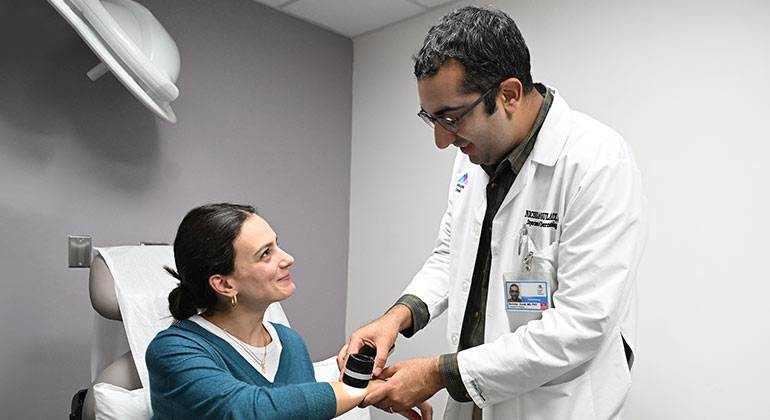Oncodermatology

Cancer treatment is never easy. The disease is stubborn and requires strong treatment. Many cancer patients receive some combination of chemotherapy, radiation, hormone treatment, and surgery. Unfortunately, these treatments often come with side effects. You can experience problems either while you are actively undergoing treatment or after you have completed it. When cancer treatment affects the skin, hair, and nails, we call it oncodermatology. If you or a loved one is experiencing skin, hair, or nail issues related to cancer treatment, the specialists at the Kimberly and Eric J. Waldman Melanoma and Skin Cancer Center can improve your quality of life.
Conditions We Treat
Your body’s reaction to cancer care depends on the precise treatment—including duration—as well as your overall health, sensitivities, and lifestyle. Not everyone’s skin, hair, and nails are affected by cancer treatment. Some treatments are more likely to cause dermatologic issues. These are:
- Radiation treatment
- Chemotherapy treatments, especially for breast, lymphoma, and lung cancer
- Immunotherapy, EGFR and other novel immunomodulators given for melanoma, lymphoma/leukemia, lung cancer, prostate cancer, and other cancers
- Transplantation treatment causing graft versus host (acute and chronic)
- Chronic immunosuppressants given long-term to patients who have received a solid organ transplant, such as kidney or liver
- Hormone treatments
These treatments can cause a wide range of skin changes. The most common are:
- Blisters
- Skin thickening and skin nodules
- Pigmentation issues (Vitiligo)
- Dryness and itching
- Irritation
- Rashes
- Skin texture changes
- Hair loss (alopecia)
In addition, patients on long-term immunosuppressants are at increased risk for skin cancer. Typically, this means squamous cell cancer, which is easily treated if caught early. Cancer treatments can also lead to difficulties with hair and nails. Your nails may become darkened or cracked. Or you might experience hair thinning and loss (alopecia).
Treatments We Offer
We offer a variety of treatments, depending on your needs and circumstances.
- Regular Check-ups: We will check your hair, skin, and nails periodically to see if there are any problems. If you are at risk of developing skin cancer due to long-term immunosuppressants, we can check for that as well.
- Reviewing your home care routine: We can make sure your routine and the products you use are appropriate.
- Treatments for rashes or reactions to chemotherapy, transplatation or immune-modulators or EGFR inhibitors: We have a variety of treatments to offer to help manage chemotherapy side effects
- Platelet-rich plasma therapy: This is a facial rejuvenation and hair loss approach.
- Mohs surgery: We use this procedure to treat skin cancer.
- Facial rejuvenation: Cancer treatment is stressful and can cause volume loss to the face. We have lasers, fillers and other options to help you regain your confidence.
- Hair loss: We can discuss invasive and non-invasive treatments to help you maintain the hair that you have and possibly reverse some types of chemotherapy-induced hair loss.
- Vitiligo: We can discuss laser and other treatments.
- The Kimberly and Eric J. Waldman Melanoma and Skin Cancer Center: We can provide more information on the treatments and clinical trials for the different types of skin cancer.